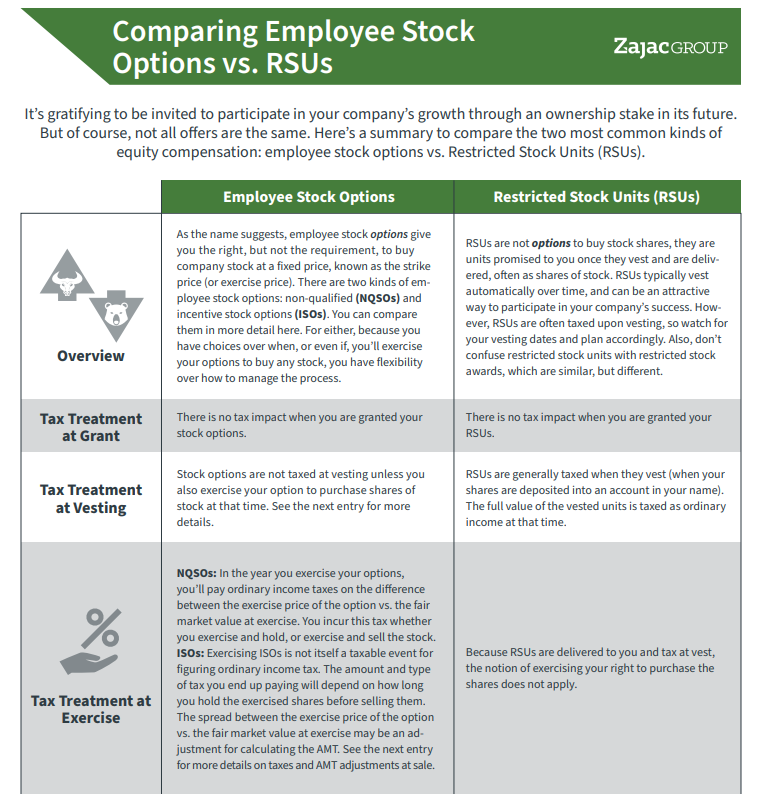
Restricted stock units or awards (RSUs) typically don’t require recipients to make too many decisions around what to do with them. Valuation, settlement, and taxation are mostly addressed through due process. That doesn’t mean you should simply ignore your RSUs. You do still have decisions to make, but managing them tends to be fairly straightforward.
Employee stock options, on the other hand, are more complicated. You need to understand what type you have, and from there, more planning is usually required in order to determine the right actions to take. If you have stock options, you may have non-qualified stock options or incentive stock options.
Fully understanding the differences between these two types of equity compensation is important, so you can make the best decisions for your situation. Let’s dig deeper into some of the key differences between restricted stock units or awards and employee stock options.
How Restricted Stock Units and Employee Stock Options Are Valued
One of the most notable differences between restricted stock and employee stock options is how they are valued.
The value of restricted stock units is based on the fair market value (FMV) of the stock only. Employee stock options, on the other hand, are valued based on leverage inherent in the difference between the exercise price of the stock option and the FMV of the stock.
COMPARISON GUIDE
Not All Stock Offers are the Same! Here's a helpful comparison between two of the most common employee stock options.
To calculate the value of restricted stock, you take the number of units (or awards) and multiply by the current value of the stock price:
RSU Value = Number of Units x Fair Market Value of Stock
Let’s assume that you have the following restricted stock grant:
- 1,000 units restricted stock
- $50.00 per share, according to fair market value
To calculate the value, its as simple as multiplying these two variables together:
RSU Value = 1,000 x $50.00 = $50,000
Calculating the value of employee stock options isn’t as straightforward. Remember, the value is based on the difference between the exercise price of the option and the FMV of the stock, multiplied by the number of options granted.
Expressed as a formula, that looks like:
Employee Stock Options Value = Number of Options x (FMV – Exercise Price)
If we continue the example above but assume you have stock options rather than RSUs, we’d also need to know the exercise price of your options. The exercise price of the stock option is the price at which you can purchase the stock.
Let’s assume the following:
- 1,000 employee stock options
- $50.00 per share, according to fair market value
- $50.00 exercise price
Here’s how to calculate the value of these stock options::
Employee Stock Option Value = 1,000 x ($50.00 – $50.00) = $0.00
Because the price you pay to buy the shares is equal to the fair market value of the shares, the stock options have no value.
If the fair market value was $90, though, the situation changes dramatically:
Employee Stock Option Value = 1,000 x ($90.00 – $50.00) = $40,000.00
In this case, the stock option allows you to buy 1,000 shares of stock at $50 per share. Because the fair market value says each share is actually worth $90, that creates a spread of $40 per share – or $40,000 total when factoring in all your options.
The fair market value of the stock price influences the value of the employee stock option grant. As the stock price increases, the value goes up. If the stock price goes down below the exercise price, the employee stock options are “under-water” and currently worth zero.
The fact that employee stock options can have no value makes them very different from RSUs. It’s highly unlikely restricted stock will be worth $0, unless a company goes bankrupt. Even with a low stock price, your units still have some degree of value to you.
How You Receive Shares of Restricted Stock Versus Taking Ownership of Stock Options
When restricted stock units vest and are no longer subject to a substantial risk of forfeiture, recipients can take ownership of their shares. Shares of stock are commonly deposited into a brokerage account for your benefit at this point.
Generally speaking with RSUs, vesting is a forced event and you don’t need to take specific action to receive your shares. You also often don’t need to buy the shares with stock in order to take ownership of them.
Once the units vest and are settled in your name, you have full ownership rights to the stock. This means you can keep the stock, sell it, transfer it, gift it, receive dividends, etc.
With employee stock options, you need to make several decisions in order to go from holding options to holding shares – and you also need to pay for the shares you want to own.
First, you need to make a decision to exercise the stock option. Then, you need to buy the stock at the exercise price of the option. Depending on your exercise price and the number of options you exercise, this may be a big number and will require some upfront planning.
In our example above, we assumed you had 1,000 employee stock options with an exercise price of $50.00 per share. If you were to exercise all 1,000 shares, you’d need to address a cash call of $50,000.
(It is possible to exercise your stock options without paying money out of pocket. You can read more about these alternative strategies for non-qualified stock options here. If you have incentive stock options, you can read more here .)
It can require a significant amount of cash upfront to exercise employee stock options – even if they have a lot of inherent value that you can tap once you own the shares. But once you exercise your options, you’ll have all the rights of ownership detailed above with RSUs.
How and When RSUs and Employee Stock Options Are Taxed
Generally speaking, you have very little, if any, control over when restricted stock is taxed. The usual exception comes from holding restricted stock awards and setting up an 83(b) election.
Unless you do an 83(b) election, your RSUs will be taxed when they vest. What you’ll owe is based on the value of the RSUs and subject to earned income, Social Security, and Medicare taxes.
To cover the pending tax liability, most employers will automatically withhold a portion of RSUs when they vest. This is typically at a statutory rate of 22% (or 37% over $1,000,000 of supplemental wages), paid through the sale of some of the restricted stock itself. That means you will likely receive fewer shares of stock in your brokerage account than the number of units that vested.
Keep in mind that the automatic withholding that occurs at vest is not intended to be the exact amount of tax you may actually owe. It may, in fact, only be a portion of the tax bill due.
It’s not uncommon for an employee’s regular income plus the value of the RSUs to push them into a higher tax bracket. In that case, you may be taxed at a higher tax rate than the 22% withheld. You may want to work with a qualified professional to determine your personal tax situation.
The vesting of employee stock options, on the other hand, isn’t necessarily a taxable event. You only generate a tax bill from your options when you exercise them.
The ability to pick and choose when to exercise your employee option gives you additional flexibility as to when you are taxed and may allow for additional planning opportunities.
If you have non-qualified stock options, the tax impact resembles that of RSUs. The value of the option is taxed as ordinary income subject to Social Security and Medicare taxes. This is true regardless of whether you keep or sell your exercised shares.
Like restricted stock, tax withholding occurs at a statutory rate and some shares may be sold at exercise to cover some or all of the tax liability. Selling some or all shares at exercise is often referred to as a cashless exercise or a sell-to-cover exercise.
If you exercise incentive stock options, how your shares are taxed is subject to what you do next.
Retaining the shares past the calendar year-end will likely generate a reportable tax event for figuring the alternative minimum tax. You may also set yourself up for a qualifying disposition, which allows you to receive preferential long-term capital gains treatment.
Selling the shares instead may give you a disqualifying sale. That means you eliminate the investment risk associated with holding a single stock position over a period of time and can immediately lock in any gains – but those gains may be subject to ordinary income tax.
If You Have Equity Comp, Know the Difference Between Restricted Stock and Employee Stock Options
If you are on the receiving end of restricted stock and employee stock options, it’s important to evaluate the advantages and disadvantages of each type. Doing so will allow you to proactively plan out a good strategy for managing the equity comp you have.
As you begin to understand how each type operates and may impact your overall financial picture, you can more intentionally determine how to fit them into your financial plan.
This material is intended for informational/educational purposes only and should not be construed as investment, tax, or legal advice, a solicitation, or a recommendation to buy or sell any security or investment product. Hypothetical examples contained herein are for illustrative purposes only and do not reflect, nor attempt to predict, actual results of any investment. The information contained herein is taken from sources believed to be reliable, however accuracy or completeness cannot be guaranteed. Please contact your financial, tax, and legal professionals for more information specific to your situation. Investments are subject to risk, including the loss of principal. Because investment return and principal value fluctuate, shares may be worth more or less than their original value. Some investments are not suitable for all investors, and there is no guarantee that any investing goal will be met. Past performance is no guarantee of future results. Talk to your financial advisor before making any investing decisions.







0 Comments